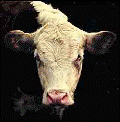Animal Science, Department of

Department of Animal Science: Dissertations, Theses, and Student Research
First Advisor
Hiep L. X. Vu
Second Advisor
Phillip S. Miller
Date of this Version
Summer 8-2022
Document Type
Thesis
Citation
Publication citation of the thesis followed APA style
Abstract
The objective of the project were to: 1) evaluate the feeding value of proso millet as a potential substitute for corn in corn-soybean meal-based diets for pigs; and 2) investigate the relationship between feed ingredients and virus survivability, followed by examining feed additive candidates that could mitigate the risk of transmission of viral pathogens.
In Exp. 1, 36 barrows were fed 1 of 4 dietary treatments, including: Diet 1, corn-soybean meal-based (control), and Diets 2, 3, and 4 had proso millet replacing 33%, 67%, and 100% of corn in the control diet, respectively. During Phase 3, pigs consuming the proso millet diets (Diets 2, 3, and 4) had greater ADFI than pigs consuming the basal diet, but ADG:ADFI was not different among groups. The growth parameters (i.e., ADG, ADFI, and ADG:ADFI) were not affected by treatments during the whole experimental period (from Phase 1 to Phase 4), suggesting that the level of corn replacement up to 100% by proso millet did not affect pig growth.
In Exp. 2, ground corn, SBM, DDGS, and a complete feed, were inoculated with PRRSV, followed by a cell-based antiviral assay and qRT-PCR to evaluate the infectivity of each virus-inoculated ingredient. A significant reduction of infectious PRRSV was observed in ground corn, DDGS and complete feed, while SBM retained the highest amount of the infectious virus among ingredients and controls. The results suggested that the survivability of PRRSV in feed appears to be influenced by ingredient type. The follow-up experiment was conducted to assess the antiviral activity of selected MCFAs, as determined by antiviral assay and qRT-PCR. The antiviral assay showed that all tested MCFA and MCFA blends inhibit PRRSV in a dose-dependent manner, indicating that MCFAs and the specific mixture of fatty acids may potentially serve as mitigants for reducing the risk of PRRSV transmission via feed.
Advisor: Hiep L. X. Vu & Phillip S. Miller


Comments
A THESIS Presented to the Faculty of The Graduate College at the University of Nebraska In Partial Fulfillment of Requirements For the Degree of Master of Science, Major: Animal Science, Under the Supervision of Professor Hiep L. X. Vu & Phillip S. Miller. Lincoln, Nebraska: August, 2022
Copyright 2022, Khang Nguyen